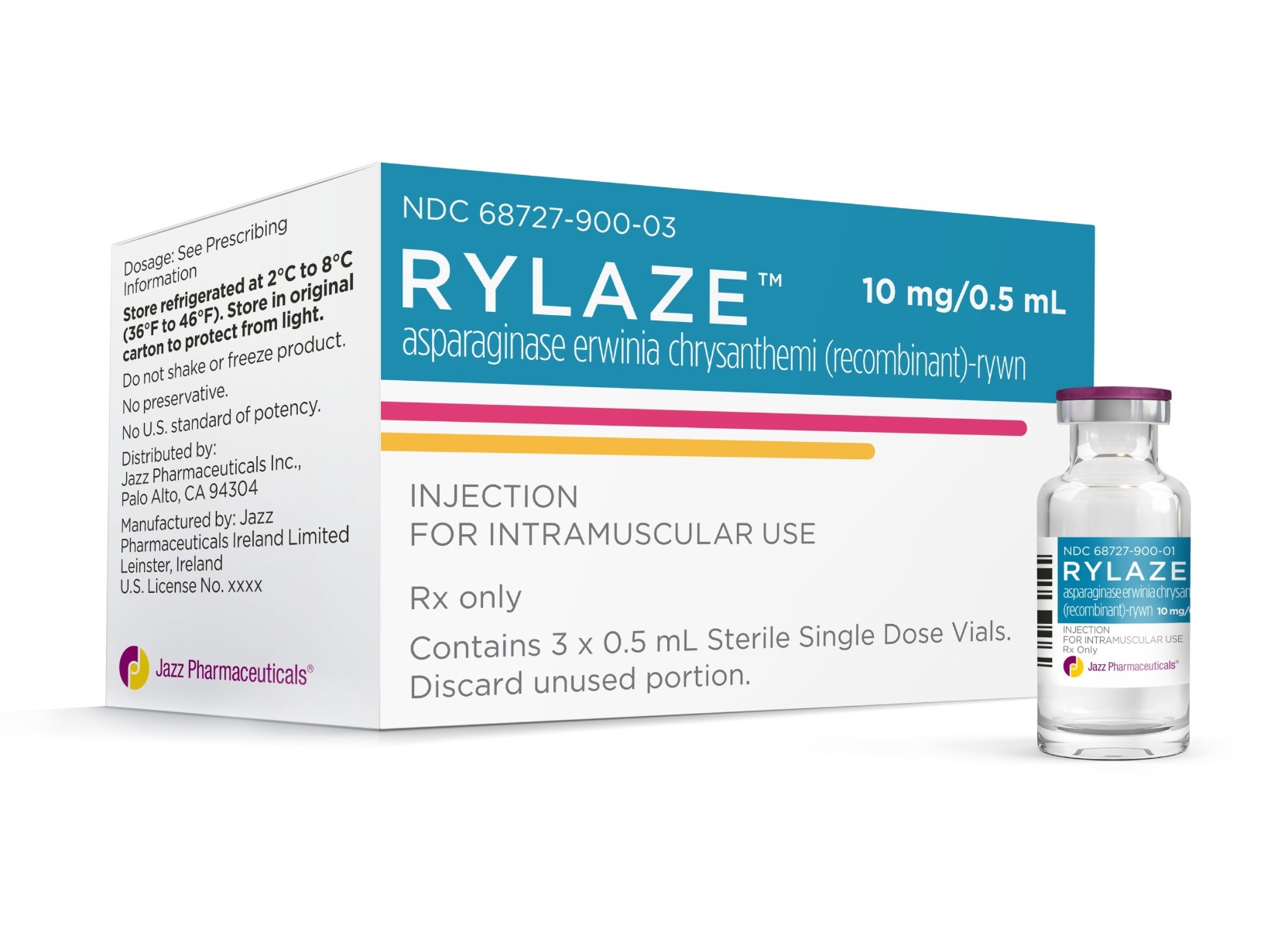Keytruda (pembrolizumab) vs Rylaze (asparaginase erwinia chrysanthemi (recombinant)-rywn)
Keytruda (pembrolizumab) vs Rylaze (asparaginase erwinia chrysanthemi (recombinant)-rywn)
Keytruda (pembrolizumab) is an immune checkpoint inhibitor, specifically a PD-1 blocker, used primarily to treat various types of cancer by enhancing the body's immune response against cancer cells. Rylaze (asparaginase erwinia chrysanthemi (recombinant)-rywn) is an asparagine-specific enzyme used to treat acute lymphoblastic leukemia (ALL) by depleting the amino acid asparagine, which leukemia cells require to grow. The choice between Keytruda and Rylaze would depend on the specific type of cancer a patient has; Keytruda is used for a broad range of cancers, including melanoma and non-small cell lung cancer, while Rylaze is specifically indicated for patients with ALL who have had hypersensitivity reactions to E. coli-derived asparaginase.
Difference between Keytruda and Rylaze
| Metric | Keytruda (pembrolizumab) | Rylaze (asparaginase erwinia chrysanthemi (recombinant)-rywn) |
|---|---|---|
| Generic name | Pembrolizumab | Asparaginase erwinia chrysanthemi (recombinant)-rywn |
| Indications | Various types of cancers including melanoma, lung cancer, head and neck cancer, Hodgkin lymphoma, and others | Acute lymphoblastic leukemia (ALL) in patients who have developed hypersensitivity to E. coli-derived asparaginase |
| Mechanism of action | Programmed death receptor-1 (PD-1) blocking antibody | Enzyme that breaks down asparagine, depriving leukemia cells of an essential amino acid for survival |
| Brand names | Keytruda | Rylaze |
| Administrative route | Injection (IV) | Intramuscular or subcutaneous injection |
| Side effects | Fatigue, musculoskeletal pain, decreased appetite, pruritus, diarrhea, nausea, rash, fever, cough, dyspnea, constipation, pain in extremity, and headache | Allergic reactions, blood clots, nausea, liver problems, pancreatitis, high blood sugar, and others |
| Contraindications | None known; however, should be used with caution in patients with a history of severe immune-mediated adverse reactions | History of serious allergic reactions to asparaginase |
| Drug class | Antineoplastic agent, PD-1 inhibitor | Antineoplastic agent, asparagine-specific enzyme |
| Manufacturer | Merck & Co. | Jazz Pharmaceuticals |
Efficacy
Keytruda (Pembrolizumab) Efficacy in Lymphoma
Keytruda, also known by its generic name pembrolizumab, is a monoclonal antibody that has been approved by regulatory agencies for the treatment of various types of cancer, including some forms of lymphoma. Specifically, pembrolizumab has shown efficacy in treating Hodgkin lymphoma, particularly in cases where patients have relapsed or are refractory to other treatments. In clinical trials, pembrolizumab has demonstrated a significant improvement in overall response rates among this patient population. The drug works by blocking the PD-1 pathway, which some tumor cells exploit to evade the immune system. By inhibiting this pathway, Keytruda can help the immune system to detect and fight cancer cells more effectively.
Rylaze (Asparaginase Erwinia Chrysanthemi (Recombinant)-rywn) Efficacy in Lymphoma
Rylaze, or asparaginase erwinia chrysanthemi (recombinant)-rywn, is an asparagine-specific enzyme used as part of a multi-agent chemotherapeutic regimen for the treatment of acute lymphoblastic leukemia (ALL), which is a type of lymphoma. While Rylaze is specifically indicated for use in patients with hypersensitivity to E. coli-derived asparaginase, its efficacy in treating ALL is well documented. It works by depleting the amino acid asparagine, which is necessary for the growth and survival of malignant cells. By depriving the cells of asparagine, Rylaze can inhibit tumor growth and promote cell death in the malignant cells.
Comparative Efficacy in Lymphoma Treatment
When comparing the efficacy of Keytruda and Rylaze in the treatment of lymphoma, it is important to note that they are used to treat different types of the disease and have distinct mechanisms of action. Keytruda is used primarily for Hodgkin lymphoma and works by modulating the immune response, while Rylaze is used in the context of ALL and functions by depriving cancer cells of an essential nutrient. The efficacy of each medication is dependent on the specific lymphoma subtype and patient characteristics, and they are often used in combination with other drugs as part of a comprehensive treatment regimen.
Conclusion
In conclusion, both Keytruda and Rylaze have demonstrated efficacy in the treatment of certain types of lymphoma. Keytruda has been beneficial for patients with relapsed or refractory Hodgkin lymphoma, improving response rates and outcomes. Rylaze has been effective in treating ALL, particularly in patients who are unable to tolerate other forms of asparaginase due to hypersensitivity. The use of these medications represents a significant advancement in the targeted treatment of lymphoma, offering hope for better management of this complex group of diseases.
Regulatory Agency Approvals
Keytruda
-
European Medical Agency (EMA), European Union

-
Food and Drug Administration (FDA), USA

-
Health Canada

-
Therapeutic Goods Administration (TGA), Australia

-
Medsafe (NZ)

Rylaze
-
Food and Drug Administration (FDA), USA

Access Keytruda or Rylaze today
If Keytruda or Rylaze are not approved or available in your country (e.g. due to supply issues), you can access them via Everyone.org.
How it works

Make an enquiry
Choose the medicine you want to buy, answer a couple of questions, and upload your prescription to speed things up. We’ll get back to you within 24 hours.


Make an enquiry
Choose the medicine you want to buy, answer a couple of questions, and upload your prescription to speed things up. We’ll get back to you within 24 hours.


Breeze through the paperwork
We'll guide you through the required documents for importing unapproved medicine, ensuring you have all the necessary information.


Get a personalized quote
We’ll prepare a quote for you, including medicine costs and any shipping, administrative, or import fees that may apply.


Receive your medicine
Accept the quote and we’ll handle the rest - sourcing and safely delivering your medicine.

Some text on this page has been automatically generated. Speak to your physician before you start a new treatment or medication.
Let's talk
If you have any questions, call us or send us a message through WhatsApp or email:
Contact us




